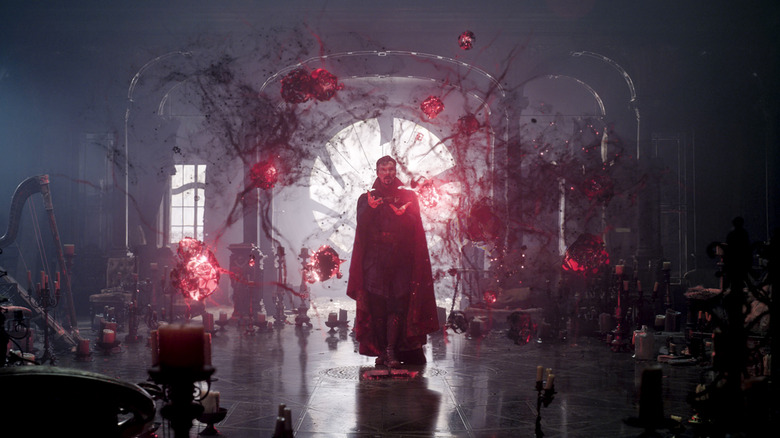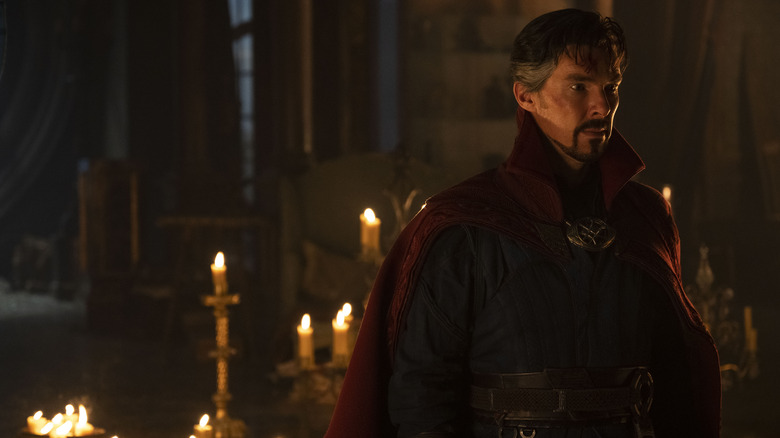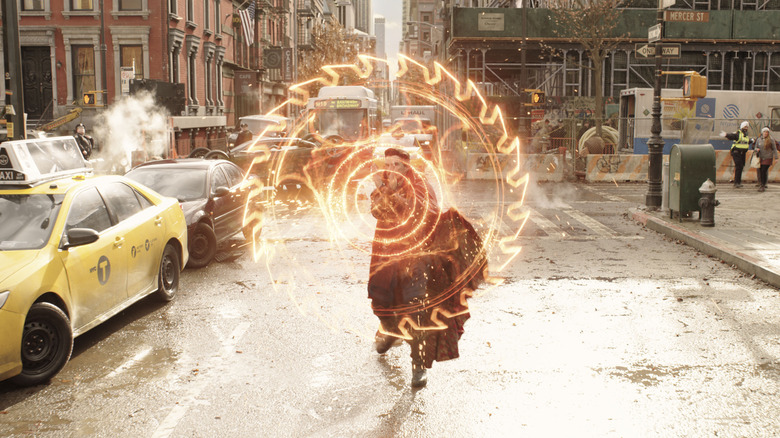Doctor Strange 2 Director Sam Raimi On Returning To Marvel And The Legacy Of Steve Ditko [Interview]
There's no avoiding potential hyperbole here, but here goes: we don't have modern cinema without Sam Raimi. What is the ongoing superhero movie boom if not an elaborate extension built upon the foundation that is his "Spider-Man" trilogy? And would we have the modern horror genre, so capable of pivoting between comedy and terror with gleeful ease, without his "Evil Dead" movies? Even his less-discussed work, like the grimy, pulpy "Darkman" and the intense, unsettling "A Simple Plan" showcase a filmmaker not satisfied to do the same thing over and over again. A Sam Raimi movie is an event, and the fact that he hasn't directed a feature in a decade is cinema's loss.
But Raimi is back, and he's returning to Marvel with "Doctor Strange in the Multiverse of Madness," a sequel about a superhero whom Raimi deadpans is probably his "fifth" favorite. While the original "Spider-Man" films saw Raimi inventing the prototype of the modern superhero movie engine, his first entry in the proper Marvel Cinematic Universe finds him having to operate within a well-oiled machine. When I spoke to the director over Zoom, he was upfront about the nature of the job — it was about serving the MCU, not about making a Sam Raimi movie. "The job is to complete mile 16 of a bridge that had been under construction for 15 years," he told me, adding that the collaborative efforts involved in making a modern Marvel movie allowed him to flex a different set of creative muscles.
During the course of our all-too-short conversation, we talked about how the art of the legendary Steve Ditko influenced "Doctor Strange in the Multiverse of Madness," the status of the hotly-anticipated "Evil Dead Rise," and if he intends to return to the smaller movies that defined his career in the '90s. We also don't talk about "Spider-Man 3," as Raimi doesn't seem to believe me when I tell him people actually like it.
'He became my fifth favorite superhero'
Your Spider-Man fandom was well-documented when you first made those movies, but were you a Doctor Strange fan growing up? How much of those early comics were you reading at the time?
Mostly I started with the Superman comic books and then I graduated to the Batman comic books. Then my brothers were reading the Marvel comic books, which were a little too complex for me until my brother pulled me aside and said you got to read Spider-Man, which I did love, but he also would read Doctor Strange, occasionally. He became my fifth favorite superhero.
Those early Stan Lee and Ditko Comics, they're wilder, cerebral. They're really psychedelic. How much of that impression did they make on you at the time?
Tremendous impression. I'd never seen anything like his illustrations for those fantastic worlds, so much scale and scope was put into those illustrations. Sometimes you'd open up a two-page Ditko landscape piece and it was incredible. In fact, if you saw the first 20 minutes of our movie, that universe where the movie starts is really based on what we call the Ditko-verse.
Were there any key moments or characters from the comics where you said, man, we've got to make sure this is in the movie?
No, that was really the look we were after. Everything else really came out of the storylines from the previous Marvel movies, as far as setting us up to where our movie would go. It wasn't about, hey, let's bring in a favorite character because we had so many characters that we had to service that there really was no room for anything else except to recognize what they needed and do them justice.
When you watch your "Spider-Man" movies and then you watch "Darkman," they are clearly the work of the same filmmaker despite the differences in scale. Can you talk about the process of working with Marvel and what that is like compared to making those movies?
It was a really exciting thing for me to do because usually ... I'm like if I was an architect, I would design unique buildings and try and scare them with this one and thrill them with that one. But this job ... it's more like this is an existing series with established characters and a fan base. And the job is to complete mile 16 of a bridge that had been under construction for 15 years. And it takes a different set of skills to do that. It's got to work with what went before. It's got to lead into what's coming. It's got to be handled to hold the same audience expectations that those other films did. It's got a great bunch of challenges that are unique to this particular job and it was great to exercise those muscles.
Filmmakers like Taika Waititi, James Gunn, and Ryan Coogler, they insert pieces of themselves into Marvel movies. Are there moments here in this movie where you said, I got to make sure this part is purely Sam Raimi?
No, that was never the plan. It was always to do justice to that which existed and to make a great experience moving forward and to set up future films. I think just any time a director reads a book or reads the screenplay and tells the crew what the part of it is, that is their style imprint. Just looking at it through the lens of your own mind's eye imparts your style to a piece, and your sense of pace about [how] the scene should run and focusing on what's important and what's dramatic — just those choices. Sticking with the Marvel universe, that really was how I approached it.
It's been nearly a decade since you directed a feature and you've been busy since then, producing a lot of stuff. Was that an intentional break from directing or were you just keeping busy with other projects?
I had to refresh myself, I didn't want to repeat myself. I didn't want to do something that was stale. I felt like I had to experience the world again, [including] filmmaking, from these young filmmakers that I was producing. I allowed myself to be inspired by them. I raised my kids, learned from that experience, and spent a lot of time in the garden thinking. And when this call finally came in, I thought, I'm refreshed. I'm hungry. I've got a lot of new experiences. I'm ready to go back to directing.
'They knew what the best stories out there were, that they were Marvel comics'
It's safe to say that modern studio movies, the movies people are excited to see, build upon a foundation you created with the "Spider-Man" films. Apologies for the broad question here, but do you personally feel responsible for having literally changed movies?
I don't think about it like that, because the bigger picture is Avi Arad was really trying to get Marvel Studios going, Kevin Feige was his assistant at that time and he was heading Marvel Studios. He was the producer behind "Blade," "X-Men" and "Spider-Man." He was trying to get the Marvel Universe, Marvel Studios going, and he did a wonderful job. He even worked on "Iron Man" and others. And then Kevin naturally took over as his assistant. I was fortunate to be able to direct the "Spider-Man" movies.
But it really was a lot of people. It was the people at Sony Pictures — Amy Pascal and John Kelly were the executives there that went to the trouble of clearing the Spider-Man rights to be made into a movie. There was a lot of people. I think it was less about the individuals than it was just time finally for Stan Lee and Steve Ditko [and] Marvel's great cast of characters to break onto the big screen. I think it's about that generation of readers, who had finally grown up to be the age of executives and filmmakers, and they knew what the best stories out there were — that they were Marvel comics.
I've got to do the hard pivot here. What's going on with "Evil Dead Rise" right now? Have you seen it? When are we going to see it?
I've seen a rough cut, a medium fine cut, and a fine cut. There's probably a few changes that [director] Lee Cronin is making that I haven't seen, but it's great. It's terrifying and it's going to knock people's socks off.
"The Hole in the Ground" is a terrific movie, but I didn't watch it and immediately think "Evil Dead." Lee Cronin is an interesting choice.
He had always liked "Evil Dead," and I loved "The Hole in the Ground." And that picture was brought to the executives that I work with and they showed it to me and I thought, this is really a great director. And we met and we talked and he said he really liked "The Evil Dead." And I said, then why don't you make the new one? I think you're just the kind guy I'd like to do it. He said, great. Let's go. We put together a script and we gave notes and he made some changes and then we raised money for the movie and he went down to New Zealand to shoot it with my partner, Rob Tapert. Now Bruce Campbell is working with him in post production sound.
I love "Spider-Man 3." It's such a fun movie and I feel like people are turning around on it, It's such a Sam Raimi movie. It's funny. It's weird. It has tremendous sense of humor about itself. Are you surprised to hear the movie has an audience of people like me who absolutely love it?
I'll believe it when I see it.
Do you have a desire go back to making another small movie? Something the size of "The Gift" or one of the "Evil Dead" movies? Or are you comfortable and content to make these big movies?
I like them all actually. They each presents its own unique challenges to the filmmaker and each is incredibly satisfying. I wouldn't want to go back to the budget of the first "Evil Dead." I mean, that was brutal. That was extremely difficult. But I would like to make something the size of "The Gift" or "A Simple Plan," those smaller budget movies that are just about the characters and thrills. An intense little horror movie would be great.
"Doctor Strange in the Multiverse of Madness" arrives in theaters all across the multiverse on May 6, 2022.


